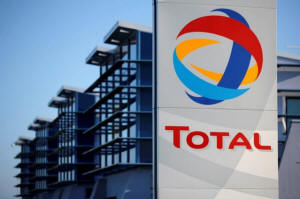|
After Iran move, Total seen in pole
position to snap up Qatar gas deals
 Send a link to a friend
Send a link to a friend
 [July 10, 2017]
By Tom Finn, Ron Bousso and Dmitry Zhdannikov [July 10, 2017]
By Tom Finn, Ron Bousso and Dmitry Zhdannikov
DOHA/LONDON (Reuters) - Total is well
placed to take a lead role in helping Qatar expand output from the
world's largest gas field, largely thanks to its involvement in the
Iranian side of the shared deposit, two sources familiar with Doha's
thinking said.
That puts the French oil major ahead of rivals like Exxon and Shell in
the early running for developing the expansion, which the tiny Gulf
state announced as it seeks to counter growing isolation caused by a
regional diplomatic rift.
Total boss Patrick Pouyanne signed a deal this month to develop the
South Pars field, as Iran's part of the shared reserves are known,
becoming the first oil major to return to the country since the lifting
of sanctions.
As he was ironing out details of that agreement, he was careful to keep
Qatar in the loop.
"Of course, I won't go to the same field in Iran without telling Qatar,"
Pouyanne told Reuters.
"The Iranian block where we are supposed to produce is next to the
border with Qatar. When I traveled to Doha I discussed it with the
(Qatari) authorities and they told us: 'It is ok - we know you'."

Pouyanne says Total strictly respects confidentiality of data vis-à-vis
each country. The executive's cross-border strategy, however, appears to
be paying early dividends.
"I would expect Total to be in the strongest position for the new
(Qatari) project, because of the political issues at play and their
recent deals in (Iran's) South Pars," one senior Gulf energy source
said.
On one level, working with both countries who share a prized gas asset
seems obvious. But it is not without risks for Total.
Saudi Arabia, the United Arab Emirates, Bahrain and Egypt have imposed
political and economic sanctions on Qatar, demanding that it stops
fostering terrorism and courting Iran, Riyadh's main rival. Qatar denies
the accusations.
Besides Iran and Qatar, Total also has large projects in Saudi Arabia
and the UAE, highlighting the complexity of investing in the Middle
East.
COST SAVINGS POSSIBLE
Qatar, already the world's largest liquefied gas exporter, lifted a
self-imposed ban on development of the North Field in April and last
week it said it would raise gas output capacity by around 30 percent to
100 billion cubic meters.
The move was widely seen as a show of strength in its dispute with Gulf
neighbors and Egypt.
Qatar has built its gas export power over the past decade with support
from global oil majors including ExxonMobil, Total, and Royal Dutch
Shell.
[to top of second column] |

The logo of French oil giant Total is seen in front of the oil
refinery of Donges, near Nantes, France, December 20, 2013.
REUTERS/Stephane Mahe/File Photo

The projects have generated billions of dollars for Qatar and its
Western partners and the planned expansion to its gas capacity would
make Qatar even more dominant in the gas market, accounting for a
third of current global LNG output.
Sources told Reuters earlier this month that Exxon, Shell and Total
have all expressed interest in helping Qatar expand its gas
facilities, with top executives traveling to Doha in recent weeks
even after a spike in political tensions.
Exxon, Shell and Total declined to comment on plans to participate
in Qatar's tenders to expand gas capacity, which are yet to be
announced and will take several years to complete.
Even without those tenders, Total's role in Qatar is set to grow
significantly after it won a 30 percent stake in 2016 in a new
25-year contract to operate its largest offshore Al-Shaheen
oilfield.
Total, which will take over the field operation from Maersk Oil on
July 14, plans to invest $2 billion in expanding the field over the
next five years.
With Qatar's gas production costs among the lowest in the world,
being a part of any expansion would give Total a strategic advantage
over rivals in the fast-growing global LNG market.
Total's involvement in fields on both sides of the Qatari-Iranian
border may also help save on costs and service contracts as well as
better understand the fields' geology, although Pouyanne said there
was no mechanism to coordinate production jointly by the countries.

The development of the new capacity over the next 5-7 years could
cost between $14-$18 billion, according to consultant Wood
Mackenzie.
"Qatar may also be keen to show it is still open for business
despite the current diplomatic disputes with some of its Gulf
neighbors," it said.
(Writing by Dmitry Zhdannikov; Editing by Mike Collett-White)
[© 2017 Thomson Reuters. All rights
reserved.]
Copyright 2017 Reuters. All rights reserved. This material may not be published,
broadcast, rewritten or redistributed.
 |